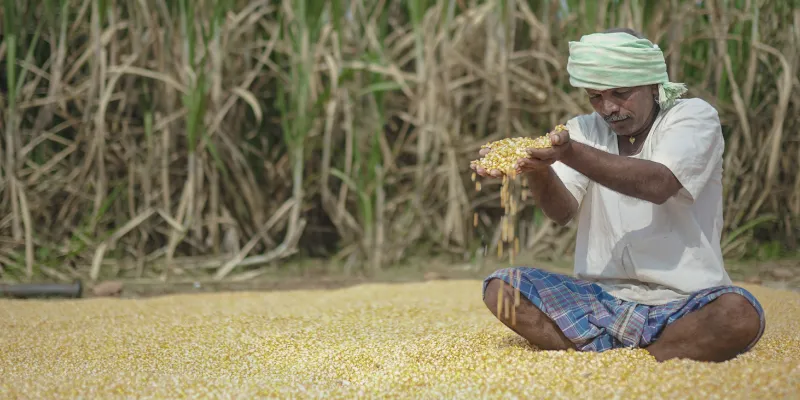
Social Alpha
View Brand PublisherHow TraceX Technologies is building trust in India’s food supply chains with FOODSIGN
Despite being one of the largest sectors in India, agriculture lacks transparency and traceability which often results in undefined crop quality and quantity, and unrealised profit for farmers. Here’s how blockchain-powered agritech startup TraceX has come to their rescue.
Lingan Gowda, a farmer in Belgaum, Karnataka is often plagued by pest attacks on maize crops. Farmers like him are usually misled by middlemen and vendors in the procurement of crop inputs. A next-generation digital agriculture platform, TraceX leverages blockchain to connect all stakeholders in the food and agri supply chain.
TraceX’s FOODSIGN app has helped Lingan increase his returns by 25 percent with both quality and quantity control – streamlining pre-harvest activities while providing timely alerts through all phases of farming. Under the Krishi Mangal project, is working with two farmers-producers organisations (FPOs) in Ramadurga taluk of Belgaum district, Karnataka, covering around 1,000 farmers who are cultivating maize and pulses.
“The Krishi Mangal-IFHD-TraceX (KMIT) project has enabled us to use household ingredients for pesticide preparation to realise sustainable yields. The training sessions have helped us to adopt sustainable and effective agriculture practices while providing better market linkages,” he says.
Ensuring traceability and transparency
Keeping track of where the product is in the supply chain has always been an area of concern in Indian agriculture. Earlier, farmers lacked clarity on crop information and its role in decision-making. FPOs were also unable to estimate the potential of member farmers for landholding or crop diversity.
The incorporation of the TraceX FOODSIGN app in the FPO system has provided a platform that helps to identify the number of agriculture inputs required for crop management. It helps FPOs in the procurement of these inputs in the right quantity.
The predefined inputs help them to visualise the quantity required for the farm area and procure them in bulk at optimum costs. This also results in cost benefits compared to market rates. The FPOs with prior knowledge of the inputs will be able to make informed decisions and reach prospective buyers. The defined set of practices for all the crop activities helps FPOs to get better market linkage with optimised costs.
Digitising the entire value chain will ensure that all the data is in one place to make data-driven decisions. Tracking and tracing at the farm level helps farmers reduce their spending on inputs while ensuring increased productivity. Additionally, farmers have access to a shared platform with FPOs and agronomists to communicate and consult about the problems in real-time and get appropriate solutions. The farmers can manage pre-harvest activities and seek the help of field supervisors and agronomists in solving their crop-related problems in real-time.
Overcoming challenges

One of the major challenges of large-scale production of any crop is ensuring food safety compliance with verifiable data.
Ensuring digitisation at every step of the way has been a challenge for TraceX, because traceability cannot exist without achieving digitisation. Co-founder Anil Nadig says that they also looked to simplify the use of the platform to make it a multilingual app that can also be accessed offline.
The reason behind doing this was to build confidence in the farmer ecosystem to leverage technology. Contrary to popular belief, agritech startups have found that Indian farmers are not averse to tech. They are traditional users and not old-timers struggling with technology. This made the founders realise that it might get difficult for them to convince farmers to pay for the software. So, they decided to opt for a usage model instead of a SaaS model with an upfront payment.
Anil further adds that the way they constructed the technology and made it work practically in the context of the Indian agribusiness ecosystem was one of the important aspects that helped them tackle challenges effectively. (TraceX evolved as a response to the challenges faced by Indian agribusinesses)
“That also helped us to get our anchor customers to sign up, who also helped us refine our products better. We also started building a team around that, and ultimately led us to being able to work with multiple businesses on large programs,” says Anil.
Connecting every stakeholder in the process
TraceX is building a technology platform that will seamlessly connect every stakeholder in the farm-to-fork process and will extend information about the produce in a trustworthy manner, shares Srivatsa Sreenivasarao, Co-founder and CEO, TraceX Technologies.
“Today, the most fundamental problem in the food supply chain is that all of this information exists in isolation, and it only works on trust. So, all that we’re trying to do is to make information available to everyone in the supply chain, right from the farmers to the consumers in a manner that builds auditability and verifiability of the information,” says Srivatsa.
TraceX works through a mobile application for farmers that helps them plan their crops well, maximise their production, and deal with agronomy practices until they’re ready to sell their produce to the aggregators. Once the produce is harvested and the aggregators come into its possession, the app tracks everything that these aggregators/processors do with the harvest.
Srivatsa adds that the best way to do this is to leverage live blockchain by creating a traceability platform that enhances supply chain visibility to build trust and maximise long-term value for businesses.
Growth and future plans
The India Foundation for Humanistic Development, an organisation that creates catalytic platforms that bring together different resources and stakeholders to enable transformation on the ground, played a crucial role by working with farmers and farmer groups to execute various CSR and government-funded projects across the country.
The objective is to strengthen the FPO function and farming community by using the FOODSIGN application to provide crop data and advisory on seeds, fertilisers, and pesticides to farmers.
Apart from that, it assures the buyers that the material harvested is of the best quality by providing proof of technology of the entire journey of the crop cycle. This transparency and traceability, in turn, help FPOs develop better market linkages and will provide an opportunity for demanding a premium for the same produce. Going forward, TraceX aims to work with more people from the sector, and also leverage the right partnerships to understand the on-ground implementation of their services better and bring holistic value to them.







